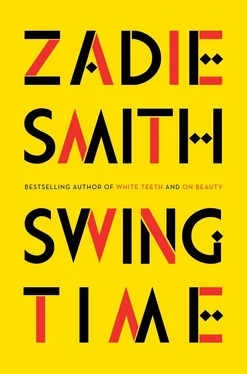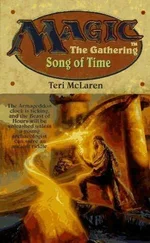Zadie Smith - Swing Time
Здесь есть возможность читать онлайн «Zadie Smith - Swing Time» весь текст электронной книги совершенно бесплатно (целиком полную версию без сокращений). В некоторых случаях можно слушать аудио, скачать через торрент в формате fb2 и присутствует краткое содержание. Город: NYC, Год выпуска: 2016, ISBN: 2016, Издательство: Penguin Publishing Group, Жанр: Современная проза, на английском языке. Описание произведения, (предисловие) а так же отзывы посетителей доступны на портале библиотеки ЛибКат.
- Название:Swing Time
- Автор:
- Издательство:Penguin Publishing Group
- Жанр:
- Год:2016
- Город:NYC
- ISBN:978-0-39956-431-4
- Рейтинг книги:4 / 5. Голосов: 1
-
Избранное:Добавить в избранное
- Отзывы:
-
Ваша оценка:
- 80
- 1
- 2
- 3
- 4
- 5
Swing Time: краткое содержание, описание и аннотация
Предлагаем к чтению аннотацию, описание, краткое содержание или предисловие (зависит от того, что написал сам автор книги «Swing Time»). Если вы не нашли необходимую информацию о книге — напишите в комментариях, мы постараемся отыскать её.
Dazzlingly energetic and deeply human,
is a story about friendship and music and stubborn roots, about how we are shaped by these things and how we can survive them. Moving from northwest London to West Africa, it is an exuberant dance to the music of time.
Swing Time — читать онлайн бесплатно полную книгу (весь текст) целиком
Ниже представлен текст книги, разбитый по страницам. Система сохранения места последней прочитанной страницы, позволяет с удобством читать онлайн бесплатно книгу «Swing Time», без необходимости каждый раз заново искать на чём Вы остановились. Поставьте закладку, и сможете в любой момент перейти на страницу, на которой закончили чтение.
Интервал:
Закладка:
As we tied our laces and prepared to get back in line, Tracey said to her mother, within my hearing: “See? She loves all them weird old songs.” It had the tone of an accusation. I knew that Tracey loved pop music, but I didn’t think the melodies were as pretty, and now I tried to say so. Tracey shrugged, stopping me in my tracks. Her shrugs had a power over me. They could end any topic. She turned back to her mother and said, “Likes old buggers, too.”
Her mother’s reaction shocked me: she looked over and smirked. At that moment my father was outside, in the churchyard, in his usual spot under the cherry trees; I could see him with his pouch of tobacco in one hand and the cigarette paper in the other, he didn’t bother to disguise these things from me any longer. But there was not a world in which I could make a cruel comment to another child and have my father — or mother — smirk, or side with me in any way. It struck me that Tracey and her mother were on the same side, and I thought there was something unnatural about this and that they seemed to know it, for in certain contexts they hid it. I felt sure that if my father had been present Tracey’s mother would not have dared to smirk.
“Best keep away from strange old men,” she said, pointing at me. But when I protested that Mr. Booth was not strange to us, that he was our dear old piano player and we loved him, Tracey’s mother seemed bored as I talked, crossed her arms over her huge chest and looked straight ahead.
“Mum thinks he’s a nonce,” explained Tracey.
I walked out of that lesson gripping my father’s hand, but I didn’t tell him what had happened. I didn’t think of asking either of my parents for help in any matter, not any more, if anything I thought only of protecting them. I went elsewhere for guidance. Books had begun to enter my life. Not good books, not yet, still those old showbiz biographies that I read in the absence of sacred texts, as if they were sacred texts, taking a form of comfort from them, though they were hack work done for quick money, barely given a second thought by their authors, surely, but to me, important. I kept certain pages folded and read lines over and over, like a Victorian lady reading her psalms. He isn’t doing that right— that was a very important one. It was what Astaire claimed he was thinking whenever he watched himself onscreen, and I noted that third-person pronoun. This is what I understood by it: that for Astaire the person in the film was not especially connected with him. And I took this to heart, or rather, it echoed a feeling I already had, mainly that it was important to treat oneself as a kind of stranger, to remain unattached and unprejudiced in your own case. I thought you needed to think like that to achieve anything in this world. Yes, I thought that was a very elegant attitude. And I became fixated, too, upon Katharine Hepburn’s famous Fred and Ginger theory: He gives her class, she gives him sex. Was this a general rule? Did all friendships — all relations — involve this discreet and mysterious exchange of qualities, this exchange of power? Did it extend to peoples and nations or was it a thing that happened only between individuals? What did my father give my mother — and vice versa? What did Mr. Booth and I give each other? What did I give Tracey? What did Tracey give me?
PART THREE: Intermission
Governments are useless, they can’t be trusted, Aimee explained to me, and charities have their own agendas, churches care more for souls than for bodies. And so if we want to see real change in this world, she continued, adjusting the incline on her running machine until I, who walked on a neighboring one, seemed to be watching her dash up the side of Kilimanjaro, well, then we ourselves have to be the ones to do it, yes, we have to be the change we want to see. By “we” she meant people like herself, of financial means and global reach, who happen to love freedom and equality, want justice, feel an obligation to do something good with their own good fortune. It was a moral category but also an economic one. And if you followed its logic all the way to the end of the revolving belt, then after a few miles you arrived at a new idea, that wealth and morality are in essence the same thing, for the more money a person had, then the more goodness — or potential for goodness — a person possessed. I mopped up my sweat with my vest and glanced at the screens in front of us: seven miles for Aimee, one and a half for me. At last she was finished, we stepped off our machines, I passed her a towel, we walked together to the editing room. She wanted to review an early cut of a promo we were making for prospective donors, which didn’t yet have its music or sound. We stood behind the director and editor and looked on as a version of Aimee, a silent version, broke soil on the school project, large spade in hand, and laid the foundation stone with the help of a village elder. We watched her dance with her six-year-old daughter, Kara, and a group of beautiful schoolgirls, in their green-and-gray uniforms, to music we could not hear, each stamp of her feet raising great clouds of red dust. I recalled seeing all these things happening months earlier, in reality, in the very moment that they happened, and thought how different they appeared now, in this format, as the editor moved things about with the ease his software allowed, inter-splicing Aimee in America with Aimee in Europe and Aimee in Africa, placing familiar events in a new order. And this is how you get things done, she announced, after fifteen minutes, satisfied, standing up, ruffling the young director’s hair and heading for the showers. I stayed and helped finish the edit. A time-lapse camera had been placed on the building site, back in February, and so now we could watch the whole school go up in a few minutes, as ant-like laborers, moving too fast to be distinguished from each other, swarmed over it, a surreal demonstration of what was possible when good people of means decided to get things done. The kind of people able to build a girls’ school, in a rural West African village, in a matter of months, simply because that is what they have decided to do.
It pleased my mother to call Aimee’s way of doing things “naïve.” But Aimee felt she had already tried my mother’s route, the political route. She’d gone to bat for presidential candidates, back in the eighties and nineties, hosting dinners, making campaign contributions, haranguing audiences from the stages of stadiums. By the time I came into the picture she was finished with all that, just as the generation she’d once encouraged to the ballot box, my generation, were finished. Now she was committed to “making change happen on the ground,” she wanted only to “work with communities at a community level,” and I honestly respected her commitment, and only occasionally — when some of her fellow good people of means came up to the Hudson Valley house, to lunch or to swim, and to discuss this or that venture — would it become very hard to avoid seeing the things my mother saw. At those times I really felt my mother at my shoulder, an invisible conscience, or an ironic commentary, pouring poison in my ear from thousands of miles away, as I tried to listen to all these various good people of means — famous for playing the guitar or singing or designing clothes or pretending to be other people — chatter over cocktails about their plans to end malaria in Senegal or bring clean wells to Sudan and so on. But I knew Aimee herself had no abstract interest in power. She was motivated by something else: impatience. To Aimee poverty was one of the world’s sloppy errors, one among many, which might be easily corrected if only people would bring to the problem the focus she brought to everything. She hated meetings and long discussions, disliked considering an issue from too many angles. Nothing bored her more than “on the one hand this” and “on the other hand that.” She put her faith instead in the power of her own decisions, and these she made with her “heart.” Often these decisions were sudden, and were never changed or rescinded once she’d made them, for she believed in her own good timing, in timing itself, as a mystical force, a form of fate, operating at the global and cosmic level as much as at the personal. In fact, in Aimee’s mind these three levels were connected. It was the good timing of fate, as she saw it, that burned down the British headquarters of YTV, on 20 June 1998, six days after she visited us, the wiring going wrong somehow, in the middle of the night, sending a fire ripping through the place, destroying those miles and miles of VHS which had been, up till then, preserved from the corrupting influence of the London Underground. We were told it would be nine months before the offices were habitable again. In the meantime everybody was moved to an ugly, featureless office block in King’s Cross. My commute was twenty minutes longer, I missed the canal, the market, Snowdon’s birds. But I spent only six days in King’s Cross. It was all over for me the moment Zoe brought a fax to my desk, addressed to me, with a phone number on it, which I was to ring, with no explanation. From the other end came the voice of Aimee’s manager, Judy Ryan. She told me Aimee herself had requested that the brown girl in green come to her offices in Chelsea and be interviewed for a possible position. I was stunned. I paced outside that building for half an hour before I entered it, shaking, all the way up in the lift and through the hall, but when I walked into that room I saw the decision already made, right there on her face. There was no anxiety for Aimee, and no doubt: none of this, in her view, was coincidence or luck or even happy accident. It was “Fate.” “The Great Fire”—as the employees christened it — was only part of a conscious effort, on behalf of the universe, to bring the two of us together, Aimee and me, a universe which at the same moment declined to intervene in so many other matters.
Читать дальшеИнтервал:
Закладка:
Похожие книги на «Swing Time»
Представляем Вашему вниманию похожие книги на «Swing Time» списком для выбора. Мы отобрали схожую по названию и смыслу литературу в надежде предоставить читателям больше вариантов отыскать новые, интересные, ещё непрочитанные произведения.
Обсуждение, отзывы о книге «Swing Time» и просто собственные мнения читателей. Оставьте ваши комментарии, напишите, что Вы думаете о произведении, его смысле или главных героях. Укажите что конкретно понравилось, а что нет, и почему Вы так считаете.












